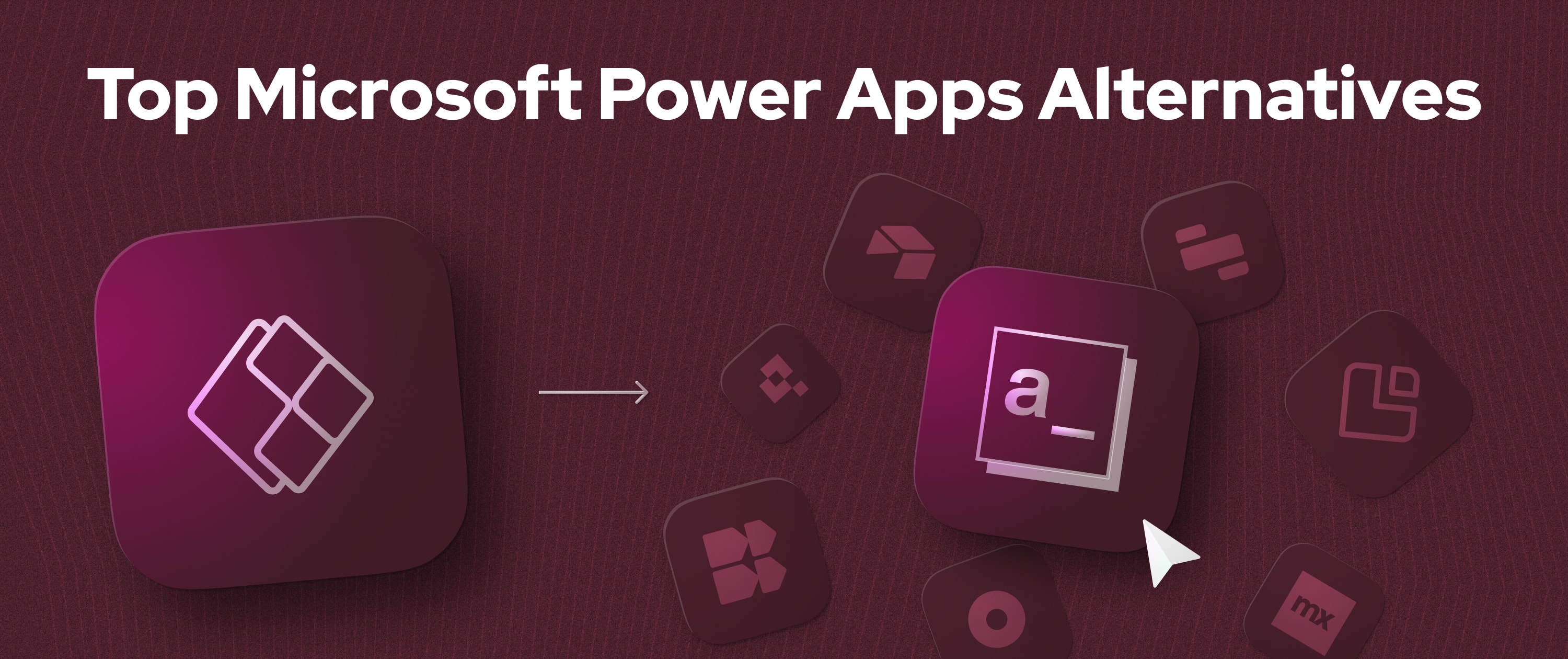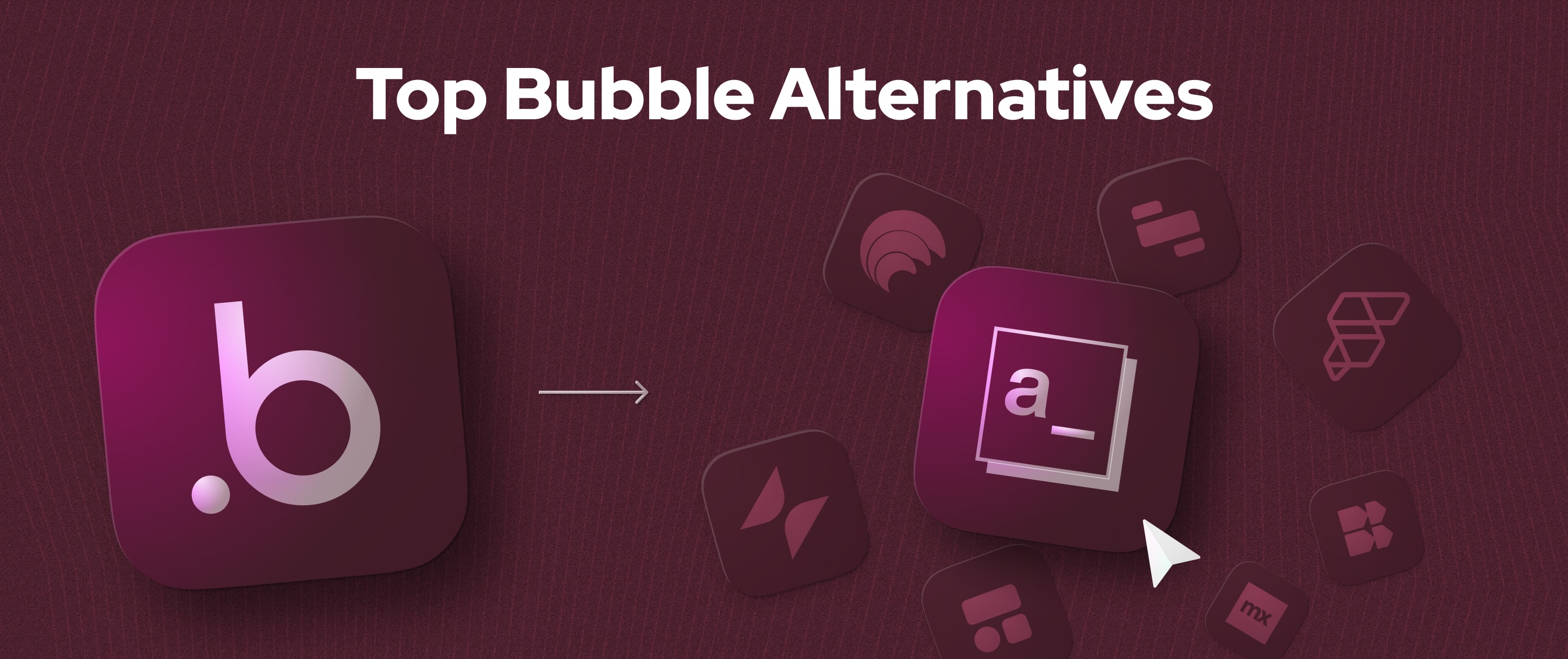Top 7 Claris FileMaker, formerly FileMaker Pro Alternatives for Your Business

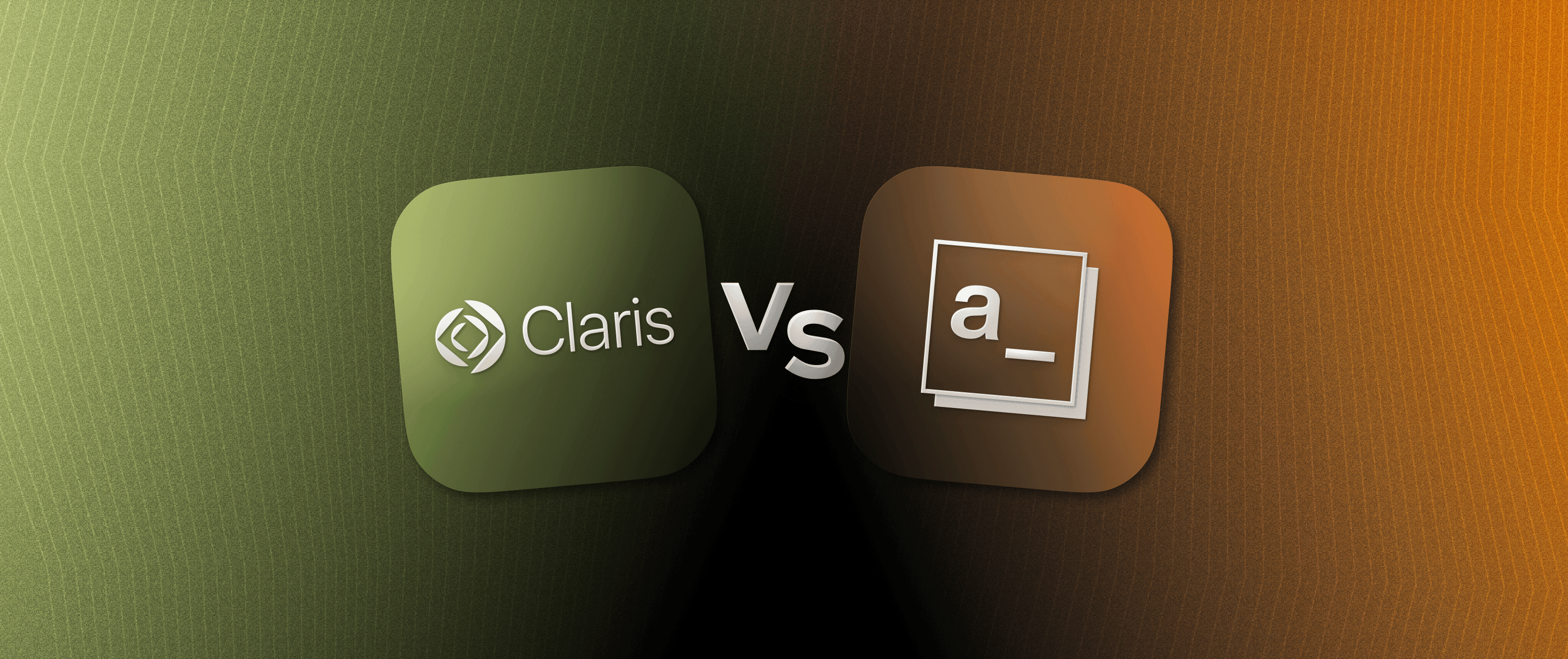
Is It Time to Rethink Your Use of Claris FileMaker (formerly FileMaker Pro)?
Claris FileMaker Pro has long been a reliable tool for building custom apps and managing data. Originally developed by Claris International, a subsidiary of Apple, it was designed as a Mac alternative to Microsoft Access.
While FileMaker has evolved to include custom interfaces and automation, its core offering as a relational database engine remains the same. However, as business needs have shifted, many find that FileMaker’s high licensing costs, sluggish performance with large datasets, and limited web and mobile capabilities no longer meet modern demands.
As a result, businesses are actively searching for a FileMaker Pro alternative that offers better scalability, flexibility, and modern integrations.
In this blog, we’ve rounded up the top 7 Claris FileMaker, formerly FileMaker Pro, alternatives that offer better performance, modern interfaces, and features tailored for today’s workflows.
Why consider alternatives to FileMaker Pro?
FileMaker Pro has long been a reliable low-code platform for custom database apps. But as business needs evolve, many teams are finding it increasingly restrictive. Here’s why you might be ready to move on:
Licensing can become expensive, especially for growing teams. Scaling should be affordable and flexible.
FileMaker Pro’s web features often lag behind modern tools, making remote work and collaboration clunky.
True flexibility often requires advanced scripting, which is hardly ideal for non-technical users.
Larger datasets can slow FileMaker Pro down, reducing efficiency when speed matters most.
Dependence on FileMaker Pro limits flexibility. Open-source options like Appsmith offer more freedom and innovation.
If these challenges resonate, it’s worth exploring modern, scalable alternatives. This blog breaks down top options to help you find the best fit.
Start Building Internal Tools Today with Appsmith
If you're looking for a scalable, customizable alternative to FileMaker Pro, Appsmith offers an open-source platform for building internal apps quickly, with both cloud and self-hosted deployment options.
How we selected the best FileMaker Pro alternatives
To help you discover the best options for FileMaker Pro, we analyzed over 20 low-code platforms, focusing on those offering superior features, flexibility, and value. Our research draws from trusted review sites like G2, Capterra, and Gartner, ensuring verified user feedback.
We shortlisted the top 7 alternatives to FileMaker Pro by assessing:
Core features: Powerful database management and automation.
User-friendliness: Intuitive interfaces for both technical and non-technical users.
Pricing and scalability: Affordable options that grow with your business.
Customization and integration: Robust customization and third-party integrations.
Support and community: Strong customer support and active user communities.
Performance: Fast, reliable platforms that handle large datasets effectively.
This approach ensures you get a solution that’s powerful, scalable but also cost-effective, and future-ready.
Comparison of the top 7 FileMaker Pro alternatives
Here’s a list of low-code platforms that can replace FileMaker Pro, based on their key features.
Alternative | Features | Ease of use | Pricing | Target Users |
Appsmith | Open-source low-code platform, flexible and developer-friendly | Requires coding knowledge for full customization | Free for individuals, paid plans for teams | Developers, IT teams, internal tools |
AppSheet | No-code app development, automation, and AI-powered workflows | Intuitive interface, great for beginners | Starts at $5/user/month | Small businesses, non-technical users |
Bubble | Drag-and-drop visual web app builder, fully responsive UI | Beginner-friendly, no coding required | Free tier available, paid plans start at $29/month | Startups, entrepreneurs, web apps |
Airtable | No-code workflow automation, database management, and collaboration tools | Extremely user-friendly, works like a spreadsheet | Free plan available, paid plans from $20/user/month | Teams, project management, data organization |
Microsoft Power Apps | Low-code development, deep integration with the Microsoft ecosystem | Requires some technical knowledge | Free plan available, Paid plan starts at $20/user/month | Enterprises, businesses using Microsoft products |
Jotform | No-code app builder, drag-and-drop UI, form-centric with app templates | Very easy to use, ideal for form-based apps | Free plan available, paid plans from $34/month | Educators, small businesses, form-heavy workflows |
Zoho Creator | Low-code platform, powerful automation, multi-platform app deployment | Easy for beginners, advanced options for devs | Paid plans from $8/user/month | SMEs, enterprises, internal business apps |
Each alternative provides unique capabilities catering to different user needs, from no-code development for beginners to highly customizable platforms for developers.
Top 7 FileMaker Pro alternatives in detail
Each alternative offers unique features and is designed to suit specific needs, from internal tools and automation to full-stack web applications
1. Appsmith - Best for building scalable enterprise applications
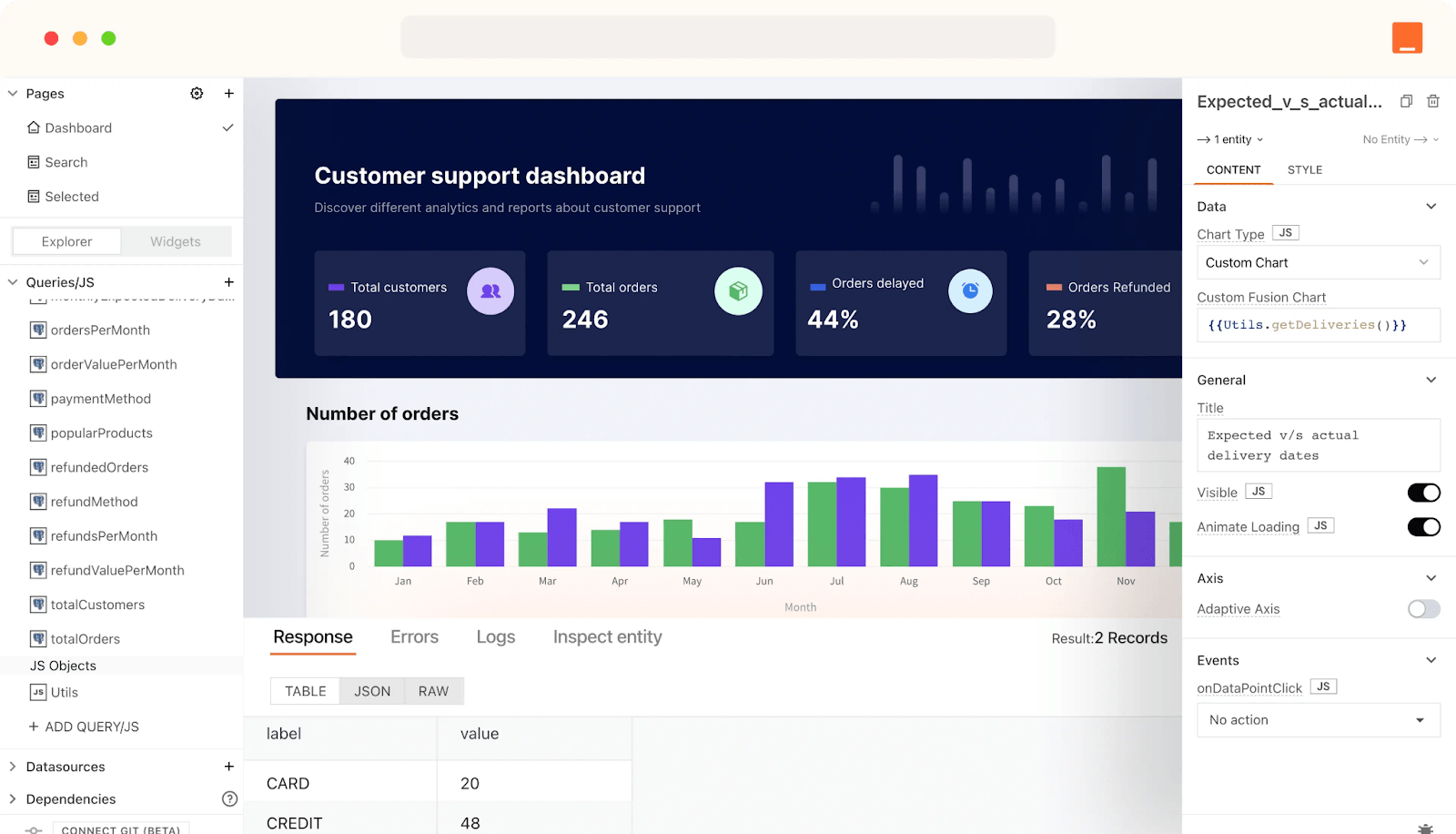
Appsmith is a fully open-source, low-code platform enabling developers to build internal tools and applications quickly. It provides a drag-and-drop interface for creating custom dashboards, admin panels, approval workflows, and tools that integrate directly with databases and APIs. For advanced users, Appsmith allows customizations using JavaScript.
Unlike Claris FileMaker, Appsmith supports self-hosting and cloud deployment, giving teams complete control over their applications. It integrates seamlessly with databases like PostgreSQL and MongoDB, along with third-party services like Slack and Google Sheets, making it a versatile and scalable solution for modern businesses.
Appsmith features better than FileMaker Pro
Features | Appsmith | Claris FileMaker |
Open Source | Yes, completely open-source | No, proprietary software |
Pricing | Free with a self-hosted option, affordable cloud plans | Requires paid licensing |
Low-Code Development | Drag-and-drop UI with extensive integrations | Low-code but primarily focused on managing databases |
Backend & API Integrations | Native support for REST, GraphQL, and databases (PostgreSQL, MongoDB, etc.) | Limited API support, requires custom scripting |
Cloud & Self-Hosting | Both cloud-based and self-hosted options are available | Primarily cloud-based with limited on-premise flexibility |
Community & Extensibility | Large developer community with open contributions | Closed ecosystem with limited external contributions |
Collaboration & Version Control | Git-based version control | Limited version control options |
UI Customization | Fully customizable UI with open-source widgets | Less flexibility in design customization |
Speed of Deployment | Faster with pre-built templates and integrations | Can be slower due to proprietary framework |
Appsmith pricing
Appsmith offers simple, user-based pricing with no extra costs for developers, no complicated user tiers, and predictable pricing aligned with platform value. From individual developers to enterprise teams, there’s a plan that fits every need.
Plan | Pricing | Key Features |
Free | $0 (Up to 5 users) | Version control, 3 Git repos, Google SSO, community support |
Business | $15/user/month (Up to 99 users) | Unlimited workspaces, custom roles, workflows, priority support |
Enterprise | $2,500/month for 100 users | Everything in Business, plus advanced security, private app embedding, 24/7 support |
Reviews from Appsmith’s users
“I tried several low-code solutions and Appsmith was the clear winner for our particular use case. The speed with which you can put together an internal tool is incredible. We've integrated it with our data warehouse, with Microsoft Teams, and with our logging, monitoring, and metrics infrastructure.”
— David Adams, CTO | Atheneum.ai
2. AppSheet - Best for no-code app development for non-technical users
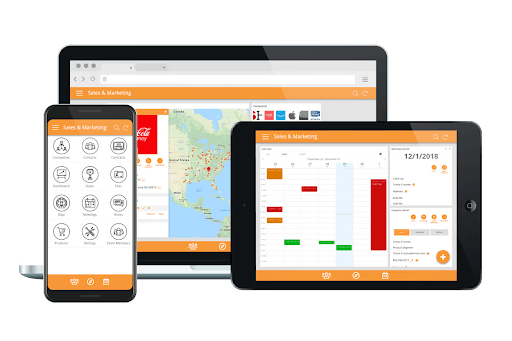
AppSheet, now part of Google Cloud, is a no-code alternative to Claris FileMaker that simplifies app creation with seamless cloud integration. It connects effortlessly to Google Sheets, Excel, cloud databases, and popular SaaS tools like Salesforce, eliminating the need for a proprietary database like FileMaker's.
This allows users to build on existing data sources, significantly reducing setup time and integration hurdles. With AppSheet, users can design custom interfaces, automate workflows, and create data entry forms, all without writing a single line of code.
Key features of AppSheet
No-code app development: Build apps without writing a single line of code using an easy visual editor.
AI-powered app creation: Get a head start with Gemini integration, which helps generate app prototypes and smart suggestions to speed up development.
Google Workspace integration: Connect with tools like Google Sheets, Google Drive, and other Workspace apps for smoother workflows.
Smart App Editor: The AppSheet Editor offers real-time suggestions and can auto-generate app prototypes to help you build faster.
Pros and cons of AppSheet
Pros of AppSheet | Cons of AppSheet |
A simple, well-organized interface lets you focus on creativity without dealing with complex code. | Offers fewer options to customize the user interface than FileMaker; limited layout, styling, and design flexibility. |
Handles large and complex datasets efficiently, even with over 60 tables. | Lacks the depth of FileMaker’s scripting engine; building complex logic can feel restrictive. |
Built-in AI features like automation and predictive models streamline tasks without needing extra tools. |
Pricing of AppSheet
Starter: $5/user/month: Basic features, connects to spreadsheets.
Core: $10/user/month: Advanced features, security controls, email support.
Enterprise Plus: $20/user/month: Security, governance, ML modeling, API integrations.
Publisher Pro: $50/app/month: Public apps without user sign-in.
Free Plan: For prototyping with up to 10 test users.
AppSheet compared to FileMaker Pro
AppSheet’s pricing starts at $10/user/month with a free trial, making it more accessible for small teams. FileMaker’s licensing can be higher, especially when scaling or needing server access.
AppSheet runs entirely in the browser with no need to install software or manage servers, while FileMaker often requires local installations or FileMaker Server/FileMaker Cloud for full functionality.
3. Bubble - Best for building full-stack web applications without writing code
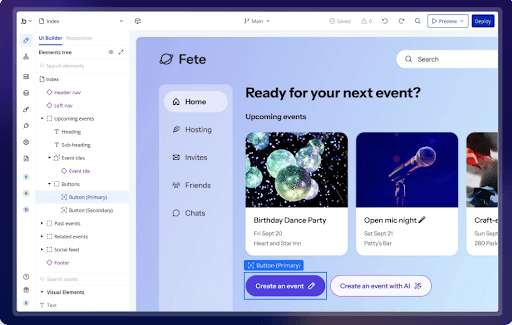
Bubble is a no-code platform for building full-blown web applications. It allows you to build anything from marketplaces to CRMs without touching code. It offers a visual editor for designing responsive web apps, a built-in database, and workflows for handling logic.
There’s also a marketplace for templates and plugins, which can speed up development. It’s more geared towards startups or entrepreneurs building consumer-facing apps rather than internal tools. There’s a learning curve, but once you get the hang of it, Bubble is pretty powerful.
Key features of Bubble
Drag-and-drop web app builder: Bubble lets you build fully functional web apps visually. You can design interfaces, workflows, and logic without writing code.
Custom workflow automation: Bubble offers detailed workflow tools to automate tasks like sending emails, updating data, or triggering actions based on user behavior.
Plugin marketplace: Extend your app’s functionality with plugins for payments (Stripe, PayPal), analytics (Google Analytics), and more.
User authentication and permissions: Add login systems and control who can access what without setting up external authentication tools.
Pros and cons of Bubble
Pros of Bubble | Cons of Bubble |
Full control over your app’s interface and layout | Requires an internet connection; no offline mode |
Built-in hosting with no server management needed | Web-first platform; mobile apps need third-party tools |
Easily launch on your own domain | Learning curve, especially for beginners |
Pricing of Bubble
Free: $0/month — For learning and exploration, with basic app creation features.
Starter: $29/month (billed annually) or $32/month (billed monthly) — For launching basic apps, includes live app, custom domain, and recurring workflows.
Growth: $119/month (annually) or $134/month (monthly) — For scaling apps with higher performance needs, includes two app editors, premium version control, and advanced security.
Team: $349/month (annually) or $399/month (monthly) — For advanced collaboration, includes multiple app editors, sub-apps, and higher security features.
Enterprise: Custom pricing — Tailored for large-scale apps with enterprise support, includes dedicated servers, priority support, and custom workload units.
Bubble compared to FileMaker Pro
Bubble offers more freedom in front-end development. You can customize the look and feel of your web app, while FileMaker’s UI tools are more limited and template-driven.
Bubble runs fully in the cloud with built-in hosting. Unlike Claris FileMaker, which often requires FileMaker Server or FileMaker Cloud for web deployment, you don't need to set up or manage any servers.
If you’re exploring alternatives to Bubble, check out a detailed list of the best Bubble alternatives.
4. Airtable - Best for data organization using a spreadsheet-like interface
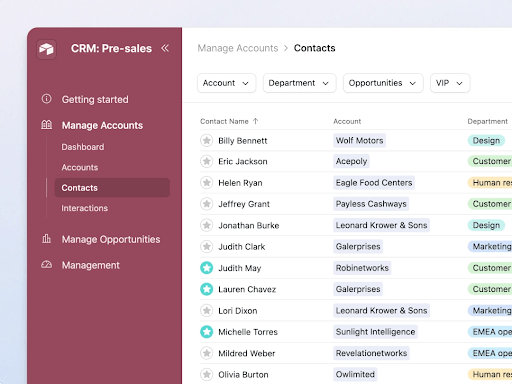
Airtable sits somewhere between a spreadsheet and a database, with some lightweight app-building features. It’s good for organizing data and creating simple workflows or interfaces using its "Interface Designer." You can also use automations and integrations with other tools like Slack, Zapier, or external APIs.
Airtable is ideal for teams managing projects, content, or operations who want a flexible database without getting too technical. But if you’re looking to build more complex applications, Airtable might feel a bit limited.
Key features of Airtable
Relational database setup: Link tables and records without needing technical knowledge simple drag-and-drop style.
Multiple views: Switch between grid, Kanban, calendar, and gallery views to work the way you want.
Automation built-in: Automate tasks like sending emails or updating records based on triggers. No coding needed.
Third-party integrations: Connect with Slack, Zapier, Google Drive, and more to keep everything in sync.
Pros and cons of Airtable
Pros of Airtable | Cons of Airtable |
Versatile tool for CRM, project management, course planning, and personal data tracking; combines spreadsheet ease with database power. | Not ideal for building standalone applications; better for database and workflow management. |
Real-time updates, comments, and @mentions help teams stay aligned and manage tasks collaboratively in one place. | Advanced features like custom permissions and higher record limits require higher-tier plans. |
Multiple views allow easy switching between spreadsheet, Kanban, and calendar formats. |
Pricing of Airtable
Free: $0/month: For individuals or small teams with basic requirements.
Team: $20/user/month (billed annually) or $24/user/month (billed monthly): For enhanced collaboration and increased capacity.
Business: $45/user/month (billed annually): For advanced customization, scalability, and administrative controls.
Enterprise Scale: Custom pricing: Tailored for large organizations with security, governance, and support needs.
Airtable compared to FileMaker Pro
Airtable is designed as a no-code platform, allowing users to create databases without needing programming skills. In contrast, FileMaker is considered a low-code platform, which may require some coding knowledge for advanced customization.
Airtable offers a variety of templates and customizable views that allow users to tailor their databases to specific needs easily. While FileMaker also provides customization, it is generally more complex and geared towards creating bespoke applications.
5. Microsoft Power Apps - Best for integrating with Microsoft 365 for enterprise-grade app development
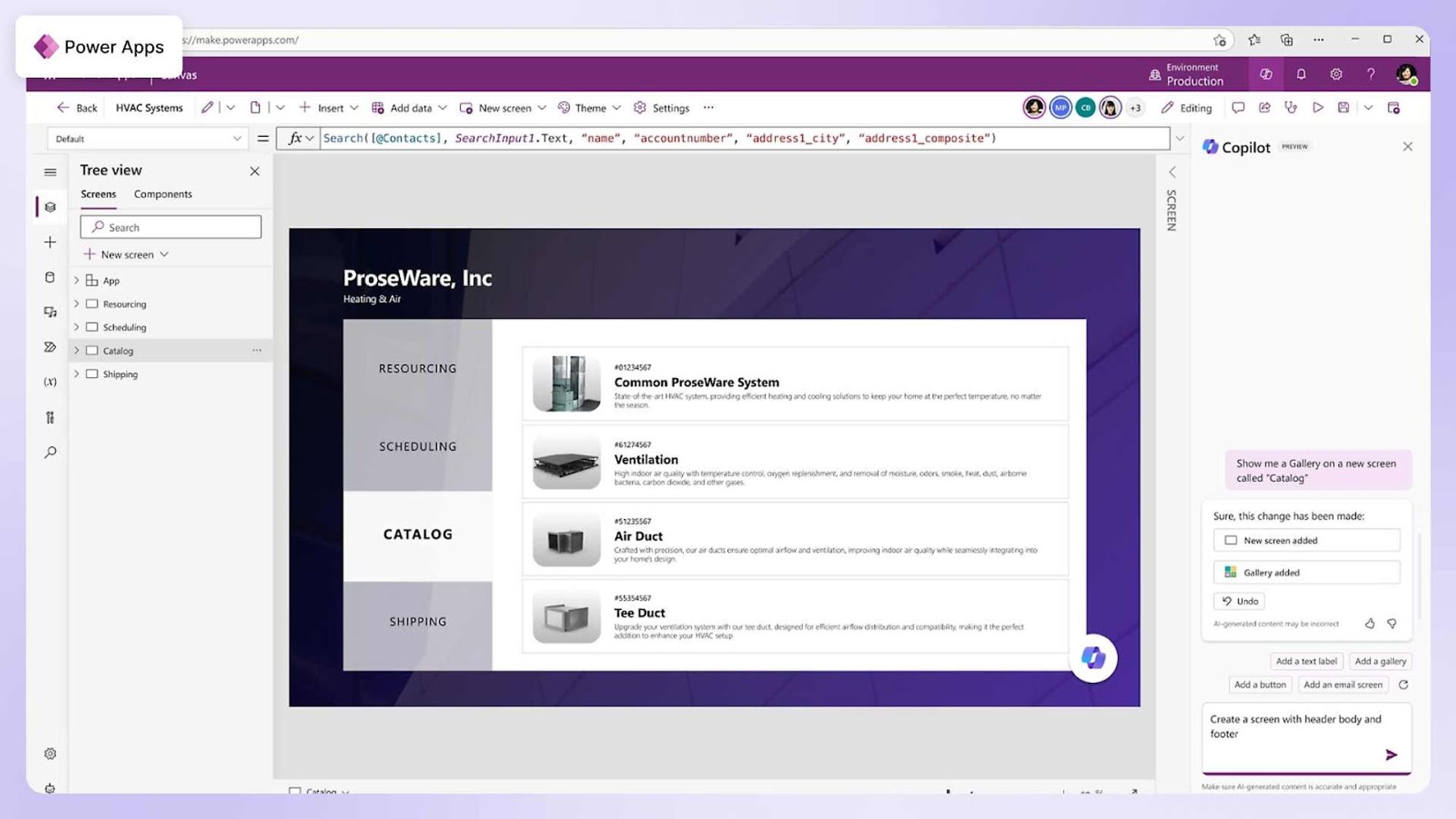
Power Apps is Microsoft’s take on low-code development, and it integrates tightly with the rest of the Microsoft 365 and Azure stack. It’s suitable for both simple forms and more advanced applications, especially in enterprise environments.
You can pull data from Excel, SharePoint, Dataverse, or external sources via connectors. It’s an excellent pick for organizations already using Microsoft tools, and it offers both canvas apps for custom UI and model-driven apps for data-heavy solutions. Licensing can be confusing, though, so it’s worth checking pricing closely.
Key features of Microsoft Power Apps
Low-code app builder: Drag-and-drop components let you build apps fast, but there’s room for advanced customizations using Power Fx and Azure services.
Data integration: Connect with hundreds of data sources like Microsoft Dataverse, SQL Server, SharePoint, and even non-Microsoft tools like Salesforce.
AI-powered features: Use built-in AI models for object detection, form processing, and more.
Cross-platform deployment: Power Apps supports web, mobile, and tablet devices right out of the box.
Pros and cons of Microsoft Power Apps
Pros of Microsoft Power Apps | Cons of Microsoft Power Apps |
A browser-based platform allows app building and management on Windows, macOS, or Linux. | A complex pricing structure with add-ons and user limits can lead to unexpected costs, especially for advanced features or integrations. |
Offers many built-in connectors and supports custom connectors for unique use cases. | Not ideal for large-scale, highly customized apps; best suited for low-code development of everyday business solutions. |
Seamless integration with tools like SharePoint, Excel, and Power Automate for data collection, workflow automation, and storage. |
Pricing of Microsoft Power Apps
Developer: $0/month: For building and testing unlimited apps or automation flows.
Premium: $20/user/month: For building, modernizing, and deploying unlimited applications.
Premium (2,000-seat minimum): $12/user/month: For organizations purchasing at least 2,000 licenses.
AI Builder Add-on: $500/unit/month: For integrating AI capabilities into applications.
Dataverse Database Add-on: $40/GB/month: For secure cloud-based data storage and management.
Power Pages Authenticated Users: $200/100 users/site/month: For granting authenticated access to low-code business websites.
Microsoft Copilot Studio: $200/25,000 messages/month: For building and running AI copilots across different channels.
Microsoft Power Apps compared to FileMaker Pro
Microsoft Power Apps integrates with the Microsoft 365 suite and Azure, making it ideal for businesses already using Microsoft tools. It offers an easy-to-use drag-and-drop interface for building simple forms and more complex enterprise apps, similar to what FileMaker Pro offers, but with deeper integrations into the Microsoft ecosystem.
Power Apps is its ability to connect to various data sources like SharePoint, Excel, and Salesforce, enabling businesses to automate workflows using Power Automate easily. While FileMaker Pro offers automation, Power Apps simplifies these processes, reducing the need for advanced scripting.
However, Power Apps' pricing model can be complex, especially for larger teams or businesses requiring more advanced features. If you're evaluating options, exploring alternatives to Power Apps to see which platform best fits your needs may be helpful. Check out the list of PowerApps alternatives for a deeper comparison.
6. Jotform - Best for creating forms and automating workflows for data collection
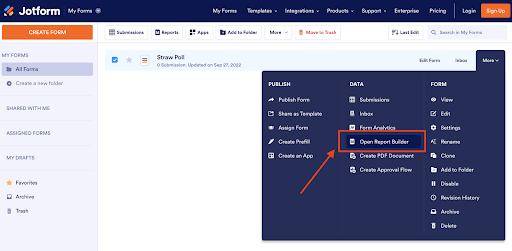
Jotform is an intuitive online form builder and data collection platform designed for effortless form creation, customization, and automation. With its drag-and-drop interface, conditional logic, and a vast template library, Jotform simplifies data gathering for businesses of all sizes.
Jotform integrates seamlessly with popular services like Google Drive, PayPal, and CRMs, making it a go-to tool for workflow automation and streamlined data management. While highly effective for form-based applications, it lacks the depth of a full-fledged relational database platform.
Key features of Jotform
Easy form builder – Design and deploy custom forms quickly with a drag-and-drop UI.
Conditional logic – Automate form responses based on user input.
Extensive integrations – Connect with 100+ services, including payment gateways and CRM tools.
Secure data collection – HIPAA, GDPR, and PCI compliance ensure data protection.
Pros and cons of Jotform
Pros of Jotform | Cons of Jotform |
User-friendly interface with minimal learning curve. | Not designed as a relational database, making complex data structuring difficult. |
Rich template library and extensive third-party integrations. | Limited advanced scripting and customization compared to traditional low-code platforms. |
Free public form submissions available (limits vary by plan). |
Pricing of Jotform
Free: 5 forms, 100 monthly submissions, and 100 MB storage.
Bronze: $34/month: 25 forms, 1,000 submissions, and 1 GB storage.
Silver: $39/month: 50 forms, 2,500 submissions, and 10 GB storage.
Gold: $99/month: 100 forms, 10,000 submissions, and 100 GB storage.
Enterprise: Custom pricing for advanced features, security, and dedicated support.
Jotform compared to FileMaker Pro
Jotform features a drag-and-drop interface that allows users to create forms without any coding knowledge. In contrast, FileMaker Pro requires more technical expertise to design and manage databases effectively, making it less accessible for beginners.
Jotform provides a free tier and various affordable pricing plans, making it a budget-friendly choice for small businesses and individuals. FileMaker Pro, on the other hand, comes with higher licensing costs, which can add up quickly, especially for larger teams or organizations requiring advanced database functionalities.
7. Zoho Creator - Best for building custom business applications with AI-powered automation
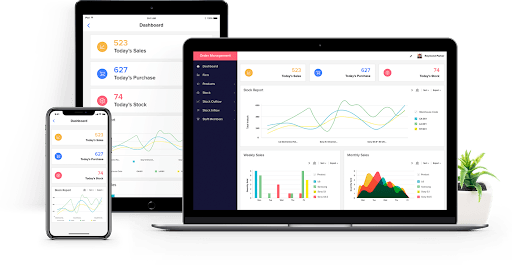
Zoho Creator is a low-code development platform designed for building custom business applications. It enables users to create apps with drag-and-drop components while supporting advanced customizations through Deluge, Zoho’s scripting language.
Zoho integrates seamlessly with the Zoho ecosystem and third-party services, making it a good choice for businesses looking to streamline operations.
Key features of Zoho Creator
AI-Powered App Development: The CoCreator, helps accelerate app-building with AI-driven recommendations. It simplifies workflows by offering automation suggestions and intelligent data structuring.
Automation Capabilities: Automate repetitive processes such as data collection, payment transactions, CRM updates, and email/report generation. Workflows can be set up with minimal coding effort.
Integration Ecosystem: Zoho Creator connects with 600+ third-party applications, including Google Workspace, Salesforce, QuickBooks, and more. Users can also build custom connectors to centralize business processes.
Pros and cons of Zoho Creator
Pros of Zoho Creator | Cons of Zoho Creator |
Affordable and scalable for small to mid-sized businesses. | Deluge scripting has a learning curve for advanced customizations. |
Built-in AI capabilities and workflow automation. | Performance issues with complex applications handling large datasets. |
Native integration with the Zoho suite (CRM, Books, Analytics, etc.). |
Pricing of Zoho Creator
Free: 1 user, 1 app, and limited features.
Standard: $8.00 per user/month
Professional: $20.00 per user/month
Enterprise (Popular): $25.00 per user/month
Zoho Creator compared to FileMaker Pro
Zoho Creator provides affordable pricing plans, making it a cost-effective solution for small to mid-sized businesses. FileMaker Pro, with its higher licensing costs and infrastructure requirements, can be expensive, especially for large teams.
Zoho Creator natively integrates with 600+ apps, including Zoho CRM, Books, Analytics, Google Workspace, and third-party tools. FileMaker Pro supports integrations but often requires custom API development, making the process more complex.
Ready to Build Better Apps?
Switching from FileMaker Pro to Appsmith allows you to scale and customize your apps with ease. Take the first step towards a more flexible solution today.
Ready to switch from FileMaker Pro? Start with Appsmith
FileMaker Pro has long been a trusted solution for building custom apps and managing data. However, as business needs evolve, many teams are finding that its high licensing costs, sluggish performance, and limited flexibility no longer meet their demands. Alternatives like Appsmith, AppSheet, Bubble, Airtable, Microsoft Power Apps, Jotform, and Zoho Creator offer modern solutions with varying degrees of customization, automation, and integration.
Each of these tools provides unique features that can help streamline workflows and improve app development. For teams seeking flexibility, scalability, and seamless integration with existing systems, Appsmith offers an open-source, low-code platform that can be tailored to your specific needs.
If you’re looking for a solution that provides both control and customization, it’s worth exploring how Appsmith can fit into your tech stack.
Frequently asked questions
Can I migrate data from Claris FileMaker to these alternatives?
Can I migrate data from Claris FileMaker to these alternatives?
Yes, most alternatives like AppSheet, Airtable, and Microsoft Power Apps allow data import from common formats like CSV or Excel. For more complex migrations, you may need API-based integrations or third-party migration tools.
Are FileMaker Pro alternatives secure and reliable?
Are FileMaker Pro alternatives secure and reliable?
Yes, all these platforms offer advanced security features like encryption, access controls, and compliance with standards such as SOC 2, HIPAA, and GDPR. Options like Appsmith support self-hosting for full control, while AppSheet and Power Apps leverage enterprise-grade cloud security.
How easy is it to get started with these alternatives?
How easy is it to get started with these alternatives?
Many platforms, including AppSheet and Bubble, offer no-code or low-code solutions requiring minimal technical knowledge to get started. They also provide detailed tutorials, community forums, and customer support to help you set up and build your applications.
How to choose the right FileMaker Pro alternative for my business
How to choose the right FileMaker Pro alternative for my business
Choosing the right alternative depends on your specific needs. If you need full customization and integrations, Appsmith may be the best fit. If you’re looking for simplicity and quick deployment, AppSheet or Airtable might be ideal. Consider factors like the complexity of your app, the required integrations, and your team’s technical expertise.
Can I try Claris FileMaker alternatives like Appsmith for free?
Can I try Claris FileMaker alternatives like Appsmith for free?
Yes, many alternatives to FileMaker Pro, including Appsmith, offer free plans or trials. Appsmith provides a free plan with basic features for individual users, allowing you to start building internal tools right away. AppSheet also offers a free tier for building no-code apps, while Bubble, Airtable, and Microsoft Power Apps provide free trials or limited free plans for you to explore their features before committing to a paid subscription.
